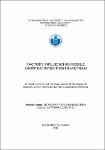| dc.description.abstract | With high usage of mobile devices (smartphone, tablets, etc.) and high usage of internet in Vietnam, it is easy to understand that Vietnam users are more likely to access internet via mobile devices. Thus, it is expected that after the development of E-commerce, now starts the introduction of M-commerce – the act of conducting business activities via mobile devices. M-commerce is now come to be in the recognition that it implies so many potential and so large a market share. Some businesses have joined in the field and already gained the early success, such as Grab (Bike, Car, Taxi), Tiki, or Sendo.
Because of the distinct characteristics of mobile devices, this research aims to shine the light into the psychology and behavior of mobile users and shoppers, which is still not much revealed in other researches. The objectives of this research are to identify the factors and how much they influence the Mobile Shopping Intention, especially in Vietnam context, as well as to provide recommendation for enterprises, both global and national, who interested in participating the competition in M-commerce field.
Based on the theoretical framework, the model was built with five constructs which are Perceived Usefulness, Perceived Ease of Use, Social Influence, Perceived Trust, and Perceived Privacy. This descriptive research applied the quantitative approach by conducting a survey from April 10 to May 10 via online form and paper questionnaire, focusing target of the age group 15 – 34 and from Ho Chi Minh and Ha Noi cities. 355 responses were received in which there are 327 valid responses. The data is then analyzed and provides results.
All five constructs have the positive relationship with Mobile Shopping Intention. Perceived Privacy is showed to be the most influential factors that affect Mobile Shopping Intention. The second most influential factor is Social Influence,
which is appropriate for a collectivistic country as Vietnam. Perceived Usefulness, Perceived Ease of Use, and Perceived Trust do have positive influence on Mobile Shopping Intention but not as much of significance.
This research has made a contribution that with different national characteristics, the factors that affect behavioral intention will differ as well as each factor’s degree of impact. Specifically in Vietnam, Privacy and Social Influence are the most concerned in Mobile Shopping Intention. Enterprises could use this insight to design and implement appropriate strategy in order to enhance the idea of mobile shopping, and increase the chance that could convert mobile users into mobile shoppers, in order to reach the wider range of potential customers. | en_US |


